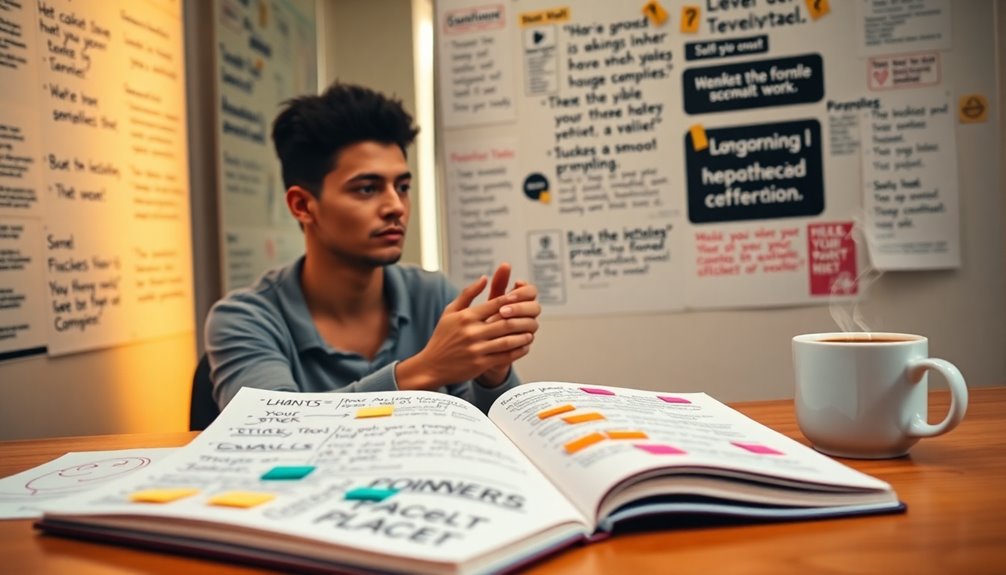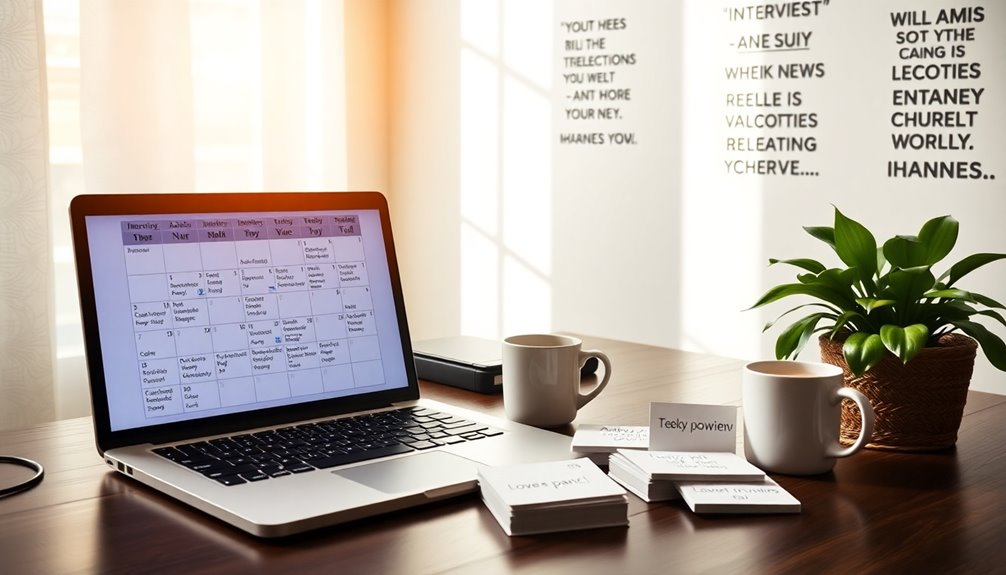Transform your interview panic into power by following a strategic prep blueprint. Start by understanding and practicing how to tackle hypothetical questions, focusing on demonstrating your thought process and problem-solving skills. Tailor your responses to job descriptions, using the STAR method to craft engaging narratives that highlight your relevant experiences. Incorporate real-world examples to showcase your emotional intelligence and adaptability. Regular mock interviews will build your confidence and refine your storytelling techniques, helping you feel prepared for any scenario. You'll find even more tips to enhance your preparation and boost your performance as you explore further.
Key Takeaways
- Engage in consistent mock interviews to build confidence and simulate real interview environments, reducing anxiety and enhancing performance.
- Utilize the STAR method to structure responses, ensuring clear storytelling that highlights relevant experiences and problem-solving skills.
- Analyze job descriptions to align your responses with key skills and values, creating tailored narratives that resonate with employers.
- Practice decision-making processes by discussing the benefits and drawbacks of various actions, showcasing critical thinking and adaptability.
- Transform personal experiences into compelling stories that illustrate your qualifications and emotional intelligence, leaving a lasting impression.
Understanding Hypothetical Questions

When tackling hypothetical questions in interviews, you'll want to focus on demonstrating your thought process and problem-solving skills. These questions aren't about finding a single correct answer; they're designed to assess your judgment and analytical abilities. Start by paraphrasing the scenario to guarantee you fully understand what's being asked. This not only clarifies the question but also shows the interviewer that you're engaged and thoughtful.
Next, evaluate the potential benefits and drawbacks of various options. This step allows you to showcase your analytical skills and decision-making capabilities. When you articulate your reasoning, consider weaving in real-world examples that illustrate your relevant skills and experiences. This approach enhances your credibility and gives the interviewer insight into how you tackle similar challenges.
Lastly, practice makes perfect. Regularly engaging in mock interviews and working through hypothetical scenarios can considerably boost your confidence and refine your response techniques. By preparing effectively, you can transform what might feel like an intimidating question into an opportunity to shine, showing that you can think critically under pressure.
Steps to Tackle Hypothetical Questions

Tackling hypothetical questions effectively involves a strategic approach that highlights your analytical skills. Start by paraphrasing the scenario presented to guarantee clarity and confirm your understanding. This sets a solid foundation for your response.
Next, think aloud while articulating your reasoning. This showcases your thought process and problem-solving abilities, allowing the interviewer to see how you approach challenges. Consider the various options available and evaluate their potential benefits and drawbacks, which demonstrates critical thinking and decision-making skills relevant to the role.
Here are three key steps to help you navigate hypothetical questions:
- Paraphrase the scenario: Make certain you fully grasp the situation before diving into your answer.
- Articulate your thought process: Sharing your reasoning helps the interviewer understand how you arrive at conclusions.
- Connect to real-world examples: Relating your response to personal qualifications enhances credibility and illustrates your capabilities in action.
Finally, practice regularly with hypothetical questions and engage in mock interviews. This will greatly boost your confidence and improve your response techniques, making you more prepared for the real thing.
Crafting Tailored Responses

Crafting tailored responses is essential for standing out in an interview. Start by analyzing the job description to pinpoint key skills and values that align with the company's culture and goals. This step helps you identify what the employer truly values, allowing you to tailor your answers accordingly.
When you respond, highlight specific experiences that demonstrate your competencies. Make sure these experiences directly relate to the responsibilities outlined in the job posting. Using the language and terminology from the job description not only creates alignment but also shows your understanding of the role.
Practice articulating these tailored responses to common interview questions. This preparation helps you deliver your answers confidently and fluidly during the actual interview. Your goal is to create a narrative that connects your past experiences to the position you're applying for, emphasizing how you can add value to the company.
The Role of Real-World Examples

When you're preparing for an interview, real-world examples can be your secret weapon. They not only demonstrate your relevant skills but also enhance your credibility in the eyes of the interviewer. By sharing specific experiences, you can showcase your ability to tackle challenges and apply your knowledge effectively. Additionally, providing examples that highlight your emotional intelligence can further illustrate your adaptability and team management skills.
Demonstrating Relevant Skills
Authenticity is essential in interviews, and demonstrating relevant skills through real-world examples can greatly enhance your credibility. When you share specific instances from your past, you're not just telling a story; you're providing concrete evidence of your abilities. This approach makes your responses more relatable and persuasive.
To effectively demonstrate your skills, consider these strategies:
- Show problem-solving methods: Illustrate how you tackled challenges and the thought process behind your decisions.
- Highlight successful outcomes: Share examples where your actions led to positive results, showcasing your effectiveness in similar situations.
- Tailor your examples: Align your stories with the job description and the company's needs, showing that you understand their unique challenges.
Navigating emotional volatility, such as that experienced during a divorce with a partner who has Borderline Personality Disorder, can serve as a powerful example of your resilience and adaptability in high-stress situations.
Effective storytelling that incorporates these real-world examples can leave a lasting impression on interviewers. It reflects your adaptability and strategic thinking, making you a memorable candidate. By using relevant experiences, you not only convey your skills but also demonstrate your potential value to the prospective employer. So, prepare to share those stories that truly highlight who you are and what you can bring to the table.
Enhancing Interview Credibility
Real-world examples serve as a powerful tool for enhancing your credibility in interviews. They provide concrete evidence of your skills and achievements, making your qualifications relatable and trustworthy to interviewers. When you share specific instances where you successfully tackled challenges, you showcase your problem-solving abilities and adaptability in a professional context.
Tailoring your examples to align with the company's needs demonstrates strategic thinking and shows that you understand how your experiences can benefit the organization. For instance, if the job requires strong project management skills, recount a time when you led a project to completion under tight deadlines, emphasizing the relevant skills you utilized.
Effective storytelling can engage interviewers and create a memorable impression, setting you apart from other candidates. Remember to include quantifiable outcomes in your examples, like percentage improvements or revenue increases. These figures add weight to your claims and illustrate your impact in previous roles, making your achievements more tangible. Additionally, consider how your experiences may relate to financial considerations in divorce, as they can provide unique insights into managing complex situations effectively.
Preparing for Hypothetical Scenarios

Practicing hypothetical scenarios can be a game-changer in your interview preparation. By regularly engaging in this practice, you'll boost your confidence and enhance the quality of your responses. It helps you think on your feet, which is essential during interviews. Mock interviews create a safe space to refine your answers and adapt your thought processes to various hypothetical questions.
When faced with a hypothetical scenario, consider these strategies:
- Paraphrase the scenario: This confirms your understanding and sets a clear foundation for your response.
- Evaluate options: Discuss the benefits and drawbacks of different courses of action to showcase your critical thinking and problem-solving skills.
- Use real-world examples: Aligning your experiences with the hypothetical question makes your answers more impactful and demonstrates your adaptability. Additionally, drawing on experiences from activities like supporting a partner ready for parenthood can illustrate your collaborative skills in challenging situations.
Building Confidence Through Practice

Building confidence in interviews is essential, and one of the best ways to achieve this is through consistent practice. Regularly tackling hypothetical questions helps you become familiar with various scenarios you might encounter, which reduces anxiety. Engaging in mock interviews with friends or mentors gives you immediate feedback, allowing you to articulate your thoughts clearly under pressure.
Simulating a real interview environment, complete with time constraints, prepares you for the stress of actual interviews, improving your overall performance. The more you practice your responses to common hypothetical questions, the better you'll become at thinking on your feet, which is vital during interviews.
Additionally, consistently rehearsing your personal experiences and qualifications in relation to potential scenarios builds a strong sense of preparedness. This familiarity makes you feel more capable and self-assured. By investing time in practice, you transform panic into power, equipping yourself with the confidence necessary to tackle any interview challenge that comes your way. Remember, the key to success lies in your preparation; the more you practice, the more confident you'll become. Moreover, knowing the gym hours can help you schedule workouts that enhance your mental and physical well-being, ensuring you are at your best for interviews.
Mastering Strategic Storytelling

Mastering strategic storytelling is your key to crafting compelling narratives that resonate with interviewers. By using engaging techniques, you can transform your experiences into memorable stories that highlight your qualifications. Let's explore how to structure these narratives effectively and tailor them to fit the role you're pursuing. Additionally, leveraging the power of imagination can enhance your storytelling by allowing you to reshape your experiences into impactful narratives that captivate your audience.
Crafting Compelling Narratives
Often, candidates underestimate the power of strategic storytelling in interviews. Crafting compelling narratives can set you apart from the competition. By using real-world examples to illustrate your skills and experiences, you make your story relatable and memorable to interviewers.
To effectively convey your message, follow a clear structure, like the STAR method (Situation, Task, Action, Result). This not only showcases your thought process but also highlights the impact of your actions. Here are some essential tips for crafting your narratives:
- Align with Company Values: Tailor your stories to resonate with the company's mission and the specific role.
- Highlight Challenges: Discuss obstacles you faced and the solutions you implemented to demonstrate your problem-solving abilities.
- Practice Delivery: Engage in mock interviews or coaching sessions to refine your storytelling and boost your confidence. Additionally, embracing a growth mindset can further enhance your ability to adapt and succeed in interviews.
Engaging Interview Techniques
Effective engagement during an interview can hinge on your storytelling abilities. Mastering strategic storytelling allows you to craft narratives that highlight your experiences and showcase your problem-solving skills. When you share compelling anecdotes, you become more memorable to interviewers, increasing your chances of success.
Utilizing the STAR method (Situation, Task, Action, Result) can help you structure your stories concisely and impactfully. This approach emphasizes your contributions while keeping your narrative focused. Tailoring your stories to reflect the company's values and the specific role strengthens your connection and illustrates cultural fit.
Practice makes perfect! Mock interviews are a great way to refine your storytelling techniques. As you transform personal experiences into persuasive narratives, you'll boost your confidence and delivery. Remember that being aware of small mistakes can greatly enhance your overall interview performance.
Here's a quick overview to help you remember key storytelling components:
| Element | Description | Example |
|---|---|---|
| Situation | Describe the context of your story | "At my previous job…" |
| Task | Explain your responsibility | "I needed to improve…" |
| Action | Detail the steps you took | "I implemented a new strategy…" |
| Result | Share the outcome | "This led to a 20% increase…" |
Engage your interviewers with powerful stories!
Frequently Asked Questions
What Are the Three P's to the Perfect Interview?
The three P's to the perfect interview are Preparation, Presentation, and Performance. You need to prepare by researching the company and practicing common questions. For presentation, focus on how you convey your skills, including your body language and attire. Finally, during your performance, demonstrate your problem-solving abilities with real-world examples. Mastering these three P's will make your interview engaging and memorable, positioning you as a strong candidate for the role.
How Do You Power Pose Before an Interview?
Have you ever wondered if your body language can actually influence your mindset? Before your interview, you can power pose by standing tall with your hands on your hips for two minutes. This simple act can elevate your testosterone levels and lower cortisol, boosting your confidence. Stretching your arms wide can also help. By incorporating these poses into your pre-interview routine, you'll walk in feeling more assertive and ready to shine.
What Is the First Step in Interview Prep Plan?
The first step in your interview prep plan is to research the company thoroughly. Immerse yourself in its mission, values, and culture, and check out any recent developments. This'll help you tailor your responses and show that you're genuinely interested. Next, review the job description carefully to pinpoint the key skills and qualifications needed. This alignment'll make your experiences shine during the interview, setting you up for success right from the start.
How Do I Pump Myself up Before an Interview?
Before an interview, think of yourself as a champion ready to step into the arena. You've got the skills and experience, so remind yourself of past victories with positive self-talk. Breathe deeply to calm those racing thoughts, and visualize yourself nailing every question. Pump up your mood with energizing music or podcasts, then create a pre-interview routine to sharpen your focus. With preparation and confidence, you'll shine like the star you are!
Conclusion
To summarize, turning panic into power during your interview prep is essential for success. Did you know that 70% of employers value problem-solving skills over technical expertise? By mastering hypothetical questions with tailored responses and real-world examples, you'll not only showcase your abilities but also build the confidence needed to shine. Practice makes perfect, so keep refining your storytelling skills, and you'll walk into that interview ready to impress. You've got this!









